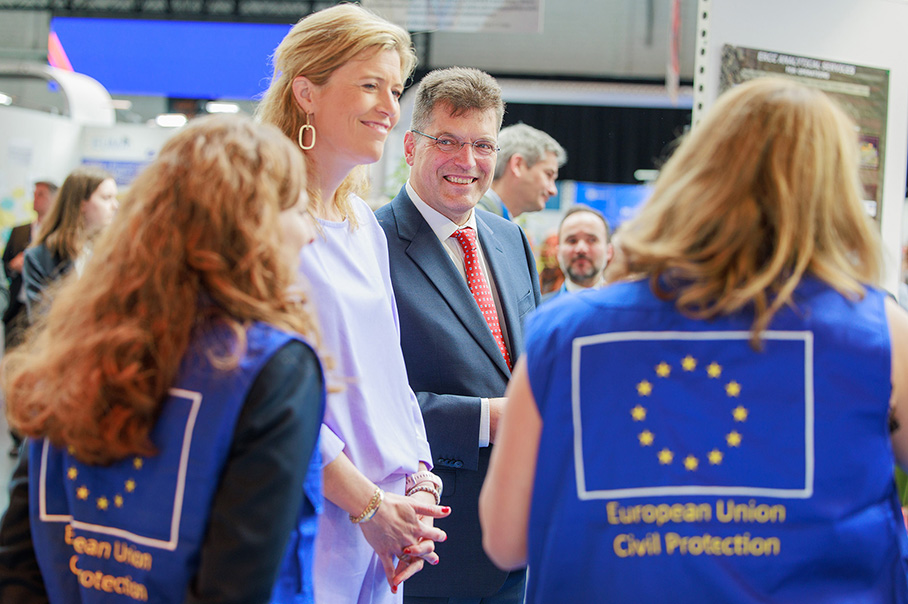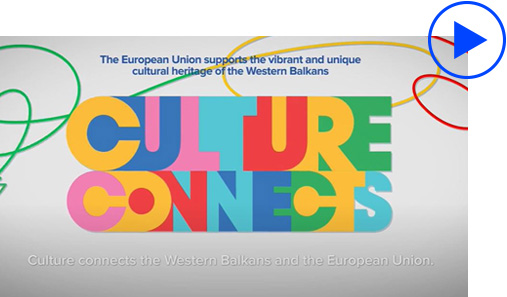Chapter 8
A stronger Europe in the world

 View photo caption
View photo caption
Conflicts, humanitarian crises and natural disasters continued to challenge the world in 2024. The European Union took an active role, reaffirming its commitment to peace, security and human dignity. In what was the third year of Russia’s aggression against Ukraine, the EU continued to strengthen its defence and security. It also worked with candidate countries, including Ukraine, on their necessary reforms, and with potential candidate countries on preparing for future accession. The EU is providing humanitarian aid for and remains committed to finding solutions to the various crises in the Middle East, including in Gaza and Syria. During the year, the EU strengthened its international partnerships, helped people in need and responded to disasters around the world. By adapting its relief efforts to new risks and building stronger partnerships, the EU consolidated its leading role in global assistance. This united approach has shown the EU’s resilience and its vision of an open, prosperous continent, even in the face of global challenges.
Enlargement
The current geopolitical tensions, notably Russia’s war of aggression against Ukraine, have underscored the importance of the enlargement policy. Enlargement is an investment in long-lasting peace, security and stability for our continent. Each new Member State strengthens the EU’s economy, creating growth and jobs.
2024 marked the 20th anniversary of the 2004 EU enlargement, the largest in its history. Twenty years ago, the EU welcomed 10 new Member States, becoming one of the world’s largest single markets. Since then, millions have benefited from new opportunities, jobs and programmes across the EU.

- Over 2.7 million young people from the 10 Member States that joined in 2004 have participated in the Erasmus+ programme since 2004.
- 26 million new jobs have been created across the EU since 2004.
- 79 % of citizens in these Member States believe that their country has benefited from EU membership.
The door to membership remains open to European countries that embrace the EU’s values and meet key criteria. Aspiring members must, among other things, demonstrate strong democratic practices, respect the rule of law, keep their economies steady and improve their governance (see also Chapter 9).
The EU regularly evaluates the progress of all enlargement countries. In October, the EU released its annual enlargement package - open a new tab., which reviews the progress made by the candidate countries (Albania, Bosnia and Herzegovina, Georgia, Moldova, Montenegro, North Macedonia, Serbia, Türkiye and Ukraine) and by the potential candidate country Kosovo (this designation is without prejudice to positions on status and is in line with UNSCR 1244/1999 and the ICJ Opinion on the Kosovo declaration of independence). The annual reports focus on key reforms, such as the rule of law, public administration, democratic institutions and meeting the economic criteria for joining the EU.
Accession negotiations, once opened, take place at intergovernmental conferences between ministers and ambassadors of the Member States and the candidate country negotiating its accession. The first such conference with Moldova - open a new tab. and Ukraine - open a new tab. took place in June 2024, formally launching their accession negotiations. The screening process - open a new tab. began in July and will continue through 2025, during which time Moldova and Ukraine must show how they plan to adopt and implement EU rules and policies and outline plans for further alignment.
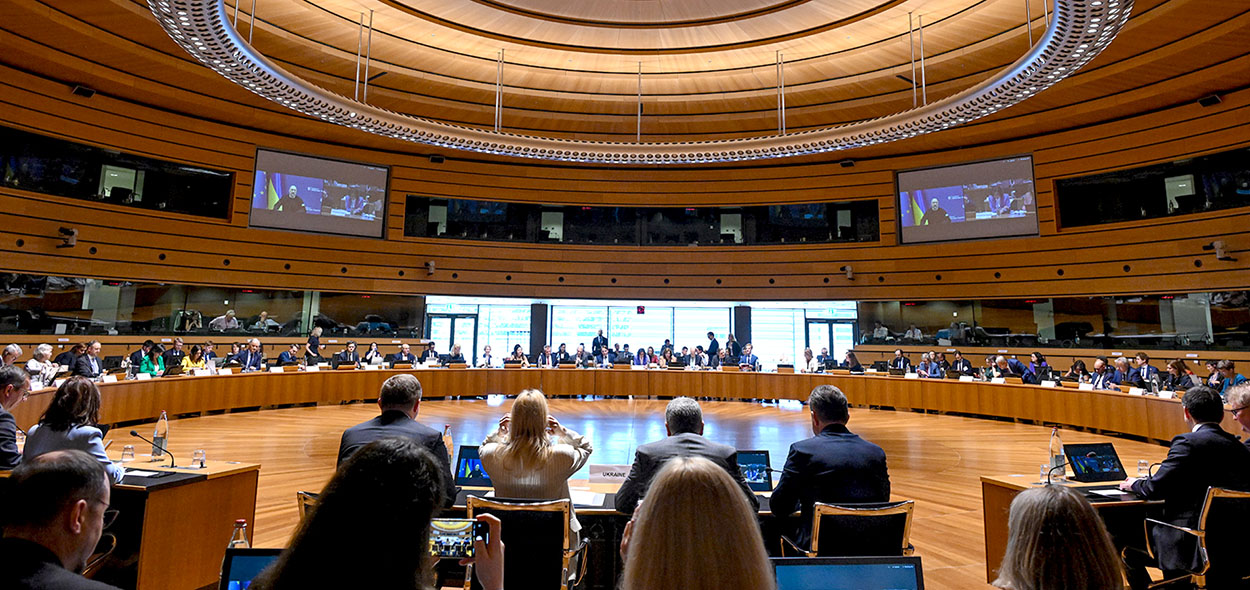
The Western Balkans’ progress on the path to EU membership in 2024


Albania and North Macedonia - open a new tab. completed the screening process, the first step towards joining the EU.
- A screening report was presented on the first of six clusters of rules for which the two countries must meet specific requirements (benchmarks), such as reforms in their judicial system, public administration, governance, etc.
- The opening of the first cluster with Albania took place at an intergovernmental conference in October.
- The opening of the first cluster with North Macedonia will take place once it meets the required conditions.

Bosnia and Herzegovina - open a new tab. began EU accession negotiations in March. A high-level forum then discussed the reforms needed for the next steps to begin.

Montenegro - open a new tab. advanced in its EU accession process, meeting key requirements on the rule of law and fundamental rights in June, as confirmed in its country report. The EU has since begun provisionally closing negotiation chapters when the relevant conditions are met, starting with three chapters in December.

Kosovo - open a new tab. achieved visa-free travel to the EU in January, meaning its citizens can now enter the EU for short stays without needing a visa.

Serbia - open a new tab. has made progress on judicial reforms and anti-corruption but still needs to fully implement media laws, better align with EU foreign policy, support civil society and media and meet its commitment to normalising relations with Kosovo.
Georgia’s bid to join the EU, however, suffered a setback in 2024 when a controversial law targeting foreign-funded organisations was passed, which sparked concerns about the deliberate stifling of independent voices and the curtailing of democratic freedoms. As a result of this and other negative developments in Georgia’s progress towards joining the EU, the accession process has effectively come to a halt.
Accession talks with Türkiye have remained at a standstill since 2018 because of ongoing concerns about democracy, the rule of law, judicial independence and respect for fundamental rights.
The prospects of a larger EU will have implications for the way the EU works. With this in mind, a communication on pre-enlargement reforms and policy reviews - open a new tab. was adopted in March, examining the implications of a larger EU in the areas of values, policies, budget and governance. This proactive approach aims to ensure the EU is prepared for future enlargement.
Supporting the reform, growth and integration of enlargement countries
Narrowing the economic gap between the EU and its future members helps prepare the latter for a smoother transition. The EU is actively supporting the development of future members through new funding tools, such as the Ukraine Facility (see Chapter 1), the Moldova Growth Plan - open a new tab. and the Growth Plan for the Western Balkans - open a new tab., and is providing expertise from current Member States to accelerate reforms.
Since 2021, the EU has provided €2.2 billion in financial assistance to Moldova, supporting energy independence, justice reforms and stronger ties with the EU. The new growth plan proposed in October will support Moldova’s path to EU membership, providing up to €1.8 billion between 2025 and 2027 to grow its economy and drive EU accession reforms.
As a result of Georgia’s democratic backsliding, the EU has downgraded political contacts and suspended the provision of €30 million under the European Peace Facility and €121 million in direct assistance to its government. This has not affected the EU’s support for civil society and independent media, as they are vital for upholding democracy. On 20 December 2024, the EU also proposed - open a new tab. that Georgian diplomats and officials, along with family members holding diplomatic or official passports, must obtain a visa to travel to the EU for short stays.
Despite their accession progress, Western Balkan countries have a gross domestic product per person that is between a quarter and a half of the EU average. To bridge this gap, the EU adopted the Growth Plan for the Western Balkans, which aims to strengthen economic ties both with the EU and within the region and potentially double the size of the Western Balkan economies within a decade. The implementation of the growth plan has started, and the €6 billion Reform and Growth Facility entered into force in May. Five of the six partners in the Western Balkans have since presented ambitious reform agendas detailing key improvements to be made in areas such as the rule of law, governance, human capital, the energy and digital transitions and the private sector, along with an indicative list of projects for investment. These reform agendas were approved in October.
New investment package for the Western Balkans under the Economic and Investment Plan
- €1.2 billion for investment in eight areas relating to rail transport, water supply and the private sector.
- The plan now includes 68 flagship projects in areas such as transport, digitalisation, energy transition, the environment, education and private-sector growth.
- The EU has already provided €5.4 billion in grants, which are expected to bring in another €17.5 billion worth of investment, covering over half of the total €30 billion plan.
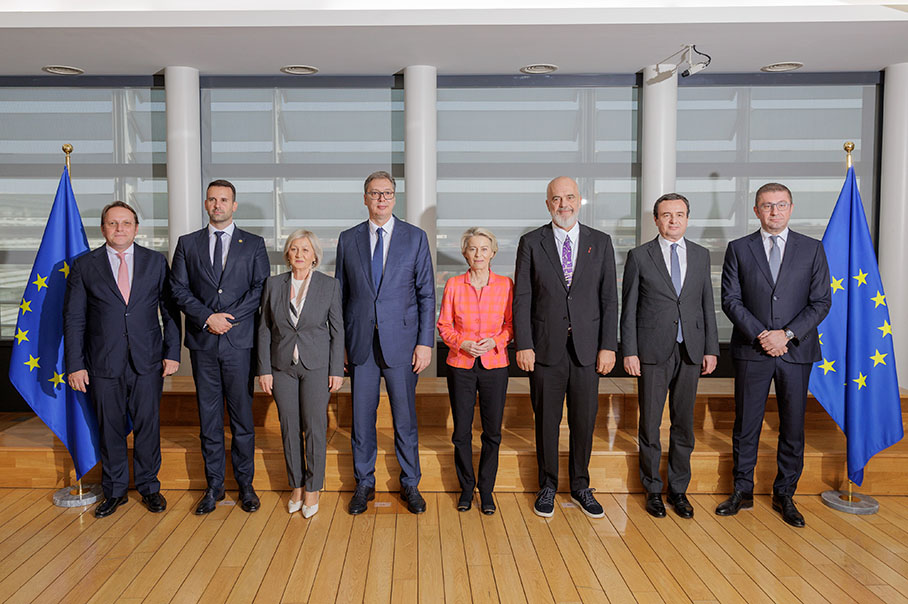

The leaders of the Western Balkans organised several ministerial meetings on the growth plan during the year to discuss integration efforts (in North Macedonia in January, in Albania in February and in Montenegro in May). Ursula von der Leyen, President of the European Commission, visited the six Western Balkans partners in autumn, while the EU–Western Balkans Summit - open a new tab. took place on 18 December.
The 2024 Berlin Process Summit - open a new tab. saw the adoption of a new action plan for the Common Regional Market to enhance regional economic integration, which is also a core objective of the growth plan.
Following tensions over illegal drilling activities in the eastern Mediterranean, the EU is gradually rebuilding ties with Türkiye through high-level visits and dialogues on health, research, innovation and trade. In addition, the EU pledged significant financial resources to support the country in various areas in 2024.
Eastern partners
The EU is also helping to strengthen economies in its Eastern Neighbourhood and to connect them more closely to the European Union.
In April, a €270 million Resilience and Growth Plan for Armenia was announced - open a new tab. at an EU–US–Armenia high-level meeting. This initiative aims to strengthen Armenia’s economy and support displaced people. Negotiations on an EU–Armenia Partnership Agenda also aim to strengthen cooperation through a bolder partnership roadmap.
Azerbaijan remains a valued energy partner, diversifying the EU’s gas sources away from Russia. The EU’s ongoing support for the Azerbaijani renewable energy sector in the context of the 29th UN Climate Change Conference (COP29) in Baku is fostering closer cooperation on the green transition.
The EU remains committed to supporting the peace negotiations between Armenia and Azerbaijan and is funding peace efforts, including support for peace dividends, through the Economic and Investment Plan. This aims to create tangible economic and social benefits that promote lasting peace in the region.

The close economic ties between Belarus and Russia have allowed Russia to circumvent some of the sanctions imposed on it. In response to the Lukashenko regime’s involvement in the war against Ukraine, additional sanctions were introduced against Belarus in June 2024. These new measures against Belarus mirror many of the measures already imposed on Russia and make the EU sanctions against Russia even more effective (see Chapter 1).
The EU’s investment in the Eastern Partnership since 2021

Since 2021, the EU’s funding to the Eastern partnership has reached €2.539 billion, with expected mobilised investment totalling €13.919 billion. This marks significant progress towards the target of €17 billion in expected mobilised investment by the end of 2027, with €3.081 billion still required to reach the goal.
Southern Neighbourhood
Greater emphasis was placed on comprehensive partnerships with the southern neighbours to improve their living standards and enhance their macroeconomic stability. These tailored partnerships make the region more secure by addressing migration’s root causes and openly tackling complex issues such as security.
In March, the EU and Egypt established a comprehensive partnership covering political relations, migration, economic stability, sustainable investment and trade. In June, they organised an EU–Egypt Investment Conference - open a new tab., attracting new investment worth €49 billion.
The signing of an important comprehensive partnership with Tunisia in 2023 led to a major EU–Tunisia Investment Conference - open a new tab. in June, at which a memorandum of understanding (a formal framework for cooperation) focusing on energy, including renewable energy, was agreed.
Recent events in the Middle East have increased uncertainty about its political, social and economic stability. The EU and the Palestinian Authority agreed on a €400 million short-term emergency financial support package for the latter to address its most pressing financial needs and support reforms. This short-term financial support will pave the way for a multi-year programme that aims to ensure the Palestinian Authority’s long-term financial stability and the implementation of its reform agenda.
President von der Leyen pledged €1 billion to Lebanon - open a new tab. during her visit to the country in May. The first part, €500 million, adopted in August, will support Lebanon in 2024 and 2025. This funding will focus on basic services such as health, education and social protection, along with water, sanitation and hygiene, for vulnerable groups, including Syrian refugees and vulnerable Lebanese. It will also support key reforms, the security sector, border management (including combating human trafficking and smuggling), economic resilience and the green transition. In addition, the EU has continued its commitment to supporting Syrian refugees through ongoing humanitarian and development aid (see the section ‘Humanitarian aid and civil protection’ below).

The EU’s investment in the Southern Neighbourhood since 2021

Since 2021, the EU’s funding to the Southern Neighbourhood has reached €5.698 billion, with expected mobilised investment totalling €26.686 billion. This marks significant progress towards the target of €30 billion in expected mobilised investment by the end of 2027, with €3.314 billion still required to reach the goal.
Western European partners
In 2024, the relationship between the EU and the United Kingdom remained a key focus, based on the full, faithful and timely implementation of the Withdrawal Agreement, including the Windsor Framework, and the Trade and Cooperation Agreement. These efforts protect the rights of millions of EU citizens and UK nationals living abroad, support economic stability and facilitate trade. Negotiations to finalise an agreement between the EU and the United Kingdom in respect of Gibraltar also continued.
The EU launched and completed negotiations with Switzerland on a broad package of agreements that aim to deepen and expand the bilateral relationship. It also made progress towards the signature of the association agreement with Andorra and San Marino.
For information on trade and technology agreements, see Chapter 2.
Global Gateway
Through the Global Gateway, its global investment strategy, the EU continued to forge partnerships around the world in 2024. Together, the EU, its Member States, development banks and European financing institutions aim to provide up to €300 billion in investment by 2027 to narrow the global investment gap and support the green and digital transitions globally.
The Global Gateway supports projects to improve digital connectivity, increase access to sustainable energy, develop transport routes and strengthen health, education and research. The goal is lasting prosperity for both partner countries and the EU.
- Up to €300 billion in investment from 2021 to 2027.
- 200+ flagship projects across the world so far.
- €3.2 billion for renewable energy projects in Africa.
- The EU and its Member States together remain the leading provider of official development assistance worldwide, with €95.9 billion in 2023 (the latest year for which data are available), representing 42 % of the total. The EU is also the biggest contributor to the World Trade Organization’s Aid for Trade initiative.
Sub-Saharan Africa
In 2024, the EU made significant strides in its partnerships with Africa, with a focus on sustainable development, health and economic growth. The EU made progress on the deployment of the €150 billion Global Gateway Africa–Europe Investment Package, targeting areas such as clean energy, digital infrastructure, transport, health and education.

At the Global Gateway High-level Event on Education - open a new tab., agreements on programmes totalling €245 million were signed, covering:
- research and learning mobility in Nigeria;
- support for girls’ education in Zambia;
- a new Team Europe initiative on vocational education and training in Africa;
- the launch of an Africa–Europe Youth Academy;
- 15 new projects for academic mobility across Africa.
These initiatives reflect the EU’s continued commitment to inclusive and quality education under the Global Gateway.
2024 initiatives in sub-Saharan Africa
- A major programme was launched in Cabo Verde - open a new tab. to support renewable energy and the digital and blue economy / strategic corridor (Praia–Dakar–Abidjan) sectors.
- A €210 million package was pledged to support Mauritania, and a new EU–Mauritania Migration Partnership - open a new tab. was launched in March.
- An additional €40 million was provided to support initiatives to strengthen Rwanda’s capabilities in vaccine research and manufacturing, and access to health products through better education, infrastructure and supply-chain management.
- Progress was made on the rehabilitation of the Kariba Dam, which is critical to Zambia’s and Zimbabwe’s clean-energy needs.
- New initiatives were launched for transboundary water management - open a new tab. in Africa.
At the third Uganda–EU Business Forum on 6 and 7 March, eight new projects worth over €200 million were launched. These projects aim to support small businesses, young female entrepreneurs, agribusinesses and digital infrastructure. The forum brought together 12 Member States, eight financial institutions, including the European Investment Bank, and 193 European companies.
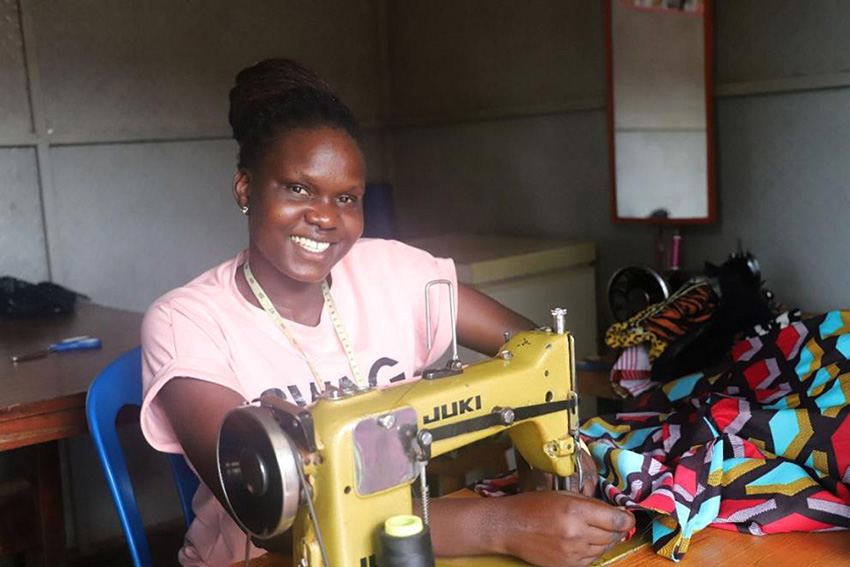
The EU helped strengthen African agriculture during the year by protecting local food products with geographical indications – quality labels that prove a product’s origin and offer access to the European market. The Partnership on Food and Nutrition Security and Sustainable Agriculture - open a new tab. worked towards the formation of a research consortium for climate change, biodiversity and gender equality in agriculture, focusing on practical farming solutions and knowledge sharing.
The Commission and South Africa, together with Global Citizen, an international advocacy group, have launched a one-year ‘Scaling up renewables in Africa - open a new tab.’ pledging campaign. It will mobilise public and private investment to accelerate renewable energy projects across the continent to give African people access to affordable energy and help reduce global emissions in line with the commitments announced at the 2023 UN Climate Change Conference (COP28).
Asia and the Pacific
As part of the Global Gateway initiative, the EU is also working to transform the Trans-Caspian Transport Corridor into a fast, modern route linking Europe and Asia. The EU also strengthened its relations with countries in the region by signing a new partnership agreement with Kyrgyzstan - open a new tab. and a memorandum of understanding and action plan on critical raw materials with Uzbekistan - open a new tab..
The EU also deepened its partnership with South-East Asia, including through closer collaboration with the Association of Southeast Asian Nations, supporting projects such as skills and job training in Cambodia - open a new tab.; sustainable agriculture and the rehabilitation of a national road in Laos - open a new tab.; and a digital economy package in the Philippines - open a new tab..

In addition, the EU has further expanded its cooperation in Asia. An important policy dialogue with Japan - open a new tab. on education, culture and sport took place in Tokyo in April, while South Korea - open a new tab. was included in the EU’s Horizon Europe research and innovation programme.
The launch of the Pacific Regional Protocol, a regional agreement under the Samoa Agreement - open a new tab. (the EU’s 20-year partnership framework with African, Caribbean and Pacific countries, signed in 2023), strengthened the EU–Pacific partnership. The EU continued supporting the Pacific Island Countries in relation to climate resilience, the blue economy and sustainable agriculture.
The Americas and the Caribbean
In 2024, the EU advanced its Global Gateway Investment Agenda - open a new tab. in Latin America and the Caribbean by launching an initiative to support fair and inclusive societies. The EU also launched EL PAcCTO 2.0 - open a new tab., a programme to combat transnational organised crime. It supports law enforcement and judicial systems in tackling challenges such as drug trafficking, human trafficking and cybercrime. Together with projects on drug policy (the Cooperation Program between Latin America, the Caribbean and the European Union on Drug Policy - open a new tab.) and border management (Eurofront - open a new tab.), these efforts are creating safer communities and stronger partnerships across the region.
Overseas countries and territories
The EU signed five new cooperation agreements with the overseas countries and territories, focusing on digitalisation, water and sanitation, the protection of marine ecosystems, sustainable tourism and intra-regional cooperation. As part of the EU’s Arctic strategy - open a new tab., a new EU office was established in Nuuk, Greenland, to strengthen the partnership between the EU and the territory.
At the G7 and G20 Summits, the Heads of State and Government of the world’s most important economies come together to address global challenges, coordinate political measures and make important commitments on global issues.
The June G7 Summit - open a new tab. in Fasano, Apulia, Italy, confirmed the G7’s strong support for Ukraine. Leaders agreed to provide an additional €45 billion loan to Ukraine, drawing on extraordinary revenues generated from immobilised Russian sovereign assets. G7 leaders also launched initiatives to strengthen economic security, enhance cooperation in the energy sector (especially with Africa), improve food security and combat human smuggling.
The G7 is also committed to promoting safe, secure and trustworthy artificial intelligence (AI). It plans to launch an action plan on the use of AI in the workplace and develop a brand to support the international code of conduct for organisations developing advanced AI systems. The EU’s AI Act (see Chapter 5) and its signing - open a new tab. of the Council of Europe’s Framework Convention on Artificial Intelligence set out frameworks to ensure AI respects human rights and democratic values.

At the G20 Summit - open a new tab. in Rio de Janeiro, Brazil, in November, leaders focused on inequality, global governance reform and climate change, and launched the Global Alliance against Hunger and Poverty. The EU joined the alliance as a founding member, together with 82 countries, the African Union, 24 international organisations, 9 international financial institutions and 31 philanthropic organisations and non-governmental organisations. At the summit, President von der Leyen announced the launch of the year-long pledging campaign on renewables in Africa. To sustain broader progress towards the targets agreed at COP28, President von der Leyen invited G20 leaders and other leaders to join forces in a new Global Energy Transition Forum. This will unite governments, international organisations and financial actors in efforts to strengthen implementation efforts.
EU relations with the Gulf Cooperation Council
The Gulf Cooperation Council brings together six Arab Gulf states to further political and economic integration. The Gulf holds almost a third of the world’s oil reserves.
The EU and its Member States hosted their first summit - open a new tab. with the council in October to discuss Middle East issues and explore how they could work together in new areas, such as:
- renewable energy
- energy security
- connectivity
- the green transition.
Founded on the ideals of peace and cooperation, the EU continued to work with its allies to tackle major global challenges in order to maintain peace, strengthen defence and protect its people. In this spirit, the EU–NATO partnership - open a new tab. gained renewed importance in 2024, helping to maintain stability on both sides of the Atlantic and providing support for Ukraine. The EU and NATO worked to better coordinate civilian and military action, making vital infrastructure more resilient and improving how they understand and respond to crises and disasters. New structured dialogues now also address issues such as cyber threats, space activities, disruptive technologies, climate-change effects and the defence industry.
The UN is another important partner of the EU in the fight for peace, security and stability. Together, they work to prevent conflicts, support peacekeeping missions and facilitate post-conflict reconstruction around the world. The EU–UN strategic partnership on peace operations and crisis management for 2022–2024 progressed during the year.
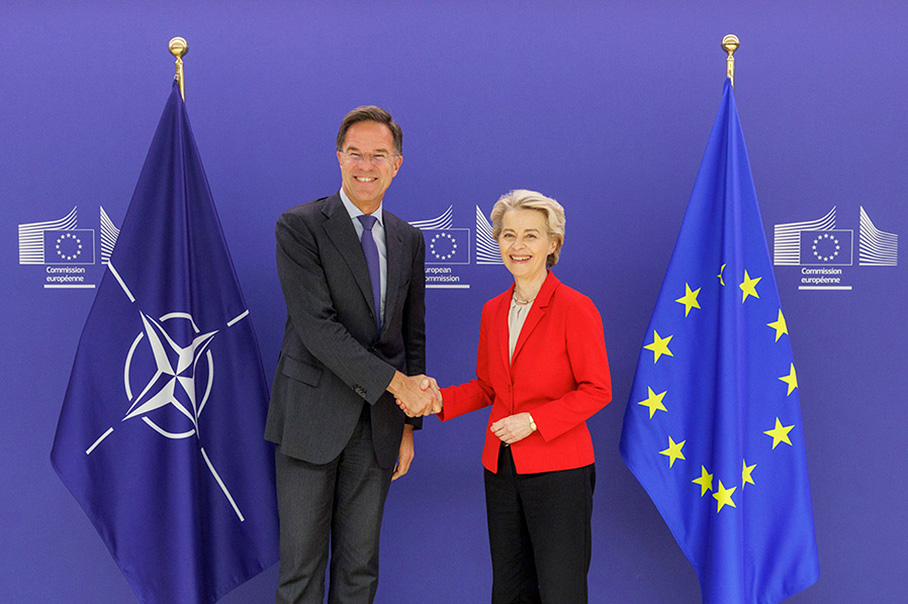
The EU–UN partnership on peace operations and crisis management
- There has been a unique and long-standing EU–UN partnership on crisis management and civilian, police and military peacekeeping, based on shared values and commitments.
- Regular high-level dialogues are held, such as in the EU–UN Steering Committee on Crisis Management, and there is continuous working-level interaction between missions and operations, along with close cooperation between headquarters.
- The EU is currently conducting 21 Common Security and Defence Policy missions and operations, of which 12 are civilian, 8 are military and 1 is civilian–military. Eleven of the 21 missions and operations are deployed in parallel with UN missions, such as in the Central African Republic, Iraq, Israel/Palestine (this designation shall not be construed as recognition of a State of Palestine and is without prejudice to the individual positions of the Member States on this issue), Kosovo, Libya and Somalia.
- Together, the Member States contribute a quarter of the UN peacekeeping budget.
Security and defence cooperation: 2024 overview
Security and defence dialogues were held with partners in the EU’s Eastern and Southern Neighbourhoods, Africa, the Indo-Pacific, Latin America and North America.
- The EU cooperated with regional organisations such as the Organisation for Security and Cooperation in Europe, the African Union and the Association of Southeast Asian Nations.
- A regional security dialogue was launched with the Gulf Cooperation Council.
Security and defence partnerships were concluded with Albania, Japan, Moldova, North Macedonia, Norway and South Korea.
The European Peace Facility.
- Support was provided for partners’ military and defence capacities.
- Twenty-six beneficiaries have been assisted so far across multiple regions:
- Africa
- the Eastern and Southern Neighbourhoods
- the Western Balkans.
- The network of military advisors in EU delegations was expanded.
The second edition of the Schuman Security and Defence Forum took place in Brussels, Belgium.
The EU recognises that decisive action is essential to maintaining peace and stability, especially in times of crisis. Events beyond the EU’s borders can have a direct impact on the security of its people. The Common Security and Defence Policy enables the EU to respond to security challenges by deploying missions and operations abroad. In doing so, the EU helps prevent conflicts, improves the ability of partner countries to deal with security issues and minimises threats that could reach Europe.
As part of this policy, the EU launched a security and defence initiative - open a new tab. in 2024 to support West African countries along the coast of the Gulf of Guinea and help them tackle security problems spreading from the Sahel, such as terrorism and illegal activities.
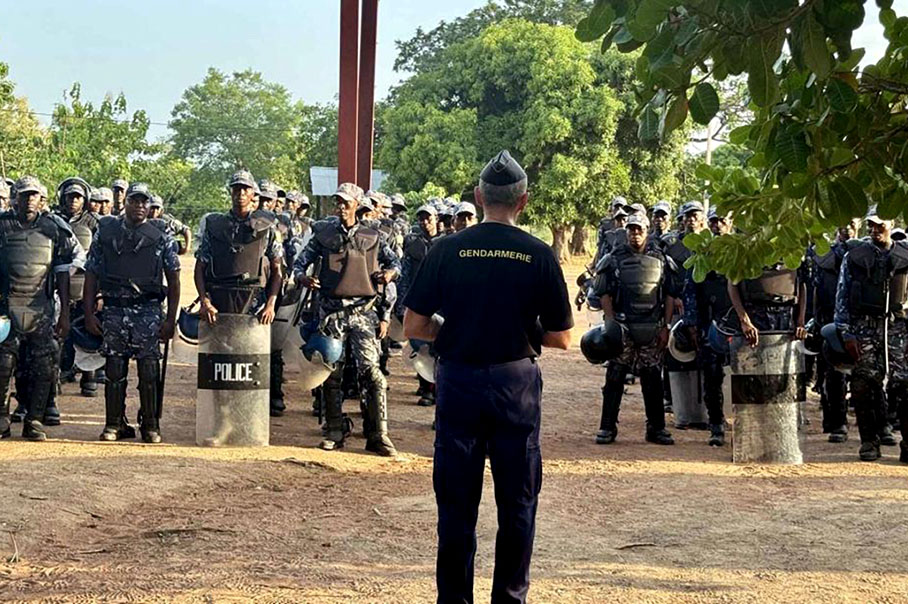
EU security and defence engagement around the world
- 5 ongoing military missions/operations.
- 12 ongoing civilian missions.
- 3 ongoing military naval operations.
- 1 civilian and military initiative.
- Integrated approach EU security and defence actions are deployed and implemented in concert with other EU tools and instruments to achieve strategic impact.
- Objectives Peacekeeping, preventing conflict, strengthening international security, supporting the rule of law, preventing human trafficking and piracy, contributing to maritime security and providing military equipment and security infrastructure to EU partners.
In February 2024, the EU also launched Eunavfor Operation Aspides - open a new tab., a sea-based operation to protect ships travelling through the Red Sea from attacks by the Houthi rebels, an armed group in Yemen. This operation helps to ensure that ships can move safely and strengthens security in the Red Sea and the nearby Gulf region.
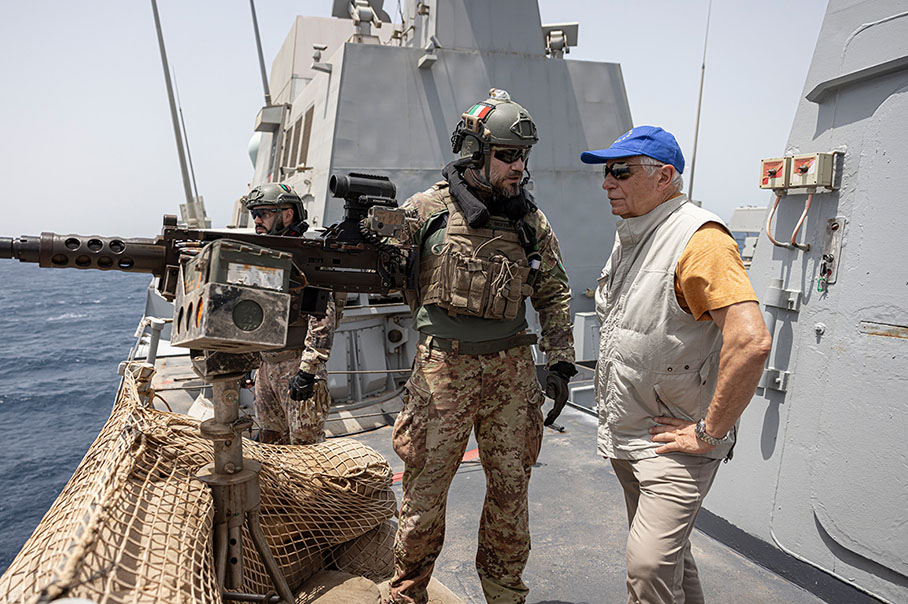
The Middle East crisis
The humanitarian situation in the Gaza Strip has deteriorated drastically since October 2023, when the brutal terrorist attack by Hamas against Israel, the subsequent escalation of hostilities between the parties and full-scale Israeli military operations aggravated an existing crisis.
In 2024, the EU continued to call for an immediate ceasefire in Gaza, the unconditional release of all hostages, an urgent increase in humanitarian aid to Gaza and an enduring end to hostilities. It also repeatedly called on all parties, including Israel, to abide by international law and international humanitarian law, in particular the Geneva Conventions, and to do everything possible to protect and not harm innocent civilians. The EU is working tirelessly to prevent further spillover of the conflict to the wider region. It remains fully committed to a lasting and sustainable peace based on the two-state solution and the relevant resolutions of the UN Security Council through reinvigorated efforts in the Middle East Peace Process.
Human toll of the Gaza crisis (as at September 2024)
- 40 000 fatalities.
- 88 000 injuries.
- 1.9 million displaced people.
More than 2.2 million people have been affected, with hundreds of thousands facing severe shortages of basic necessities such as food, water and shelter. Damage to school and hospital infrastructure has further impacted access to vital services. Children are bearing the heaviest burden, with many of them facing both physical and psychological trauma. The West Bank too is grappling with a deteriorating situation, as widespread settler violence - open a new tab. intensifies humanitarian needs among Palestinian communities.
In the midst of these challenges, the EU remains committed to its humanitarian mission, providing a lifeline through direct assistance and substantial financial support. This wide-ranging aid is providing essential services – from food and clean water to medical care, shelter, education and protection – to those most in need across the affected areas. The EU’s emergency response system, the EU Civil Protection Mechanism - open a new tab., was also activated 10 times in 2024 to provide assistance to Gaza, coordinate evacuations and support neighbouring countries affected by the crisis.

Despite the significant security risks, the EU continues to provide assistance under the mechanism, including through the Cyprus Maritime Corridor - open a new tab., a key sea route through which Germany, Cyprus, Romania and Slovakia have provided food and shelter materials. Nine Member States have supported the Egyptian Ministry of Health with in-kind assistance. The mechanism is also supporting its partners by sending experts and coordinating medical evacuations - open a new tab. of seriously ill Palestinian patients to Europe.

Over 20 years of EU support for Palestinians
The EU is the largest international donor to the Palestinian people.
Development support
- 2014–2020 €2.2 billion allocated.
- 2021–2024 €1.36 billion allocated (of which more than €920 million has been approved).
Humanitarian support
- Since 2000 More than €1.1 billion.
- In 2024 €238 million of humanitarian aid committed (*). More than 4 000 tonnes of humanitarian supplies for Palestinians in need in Gaza.
(*) Including the additional top-up of €45 million announced by President von der Leyen in September.
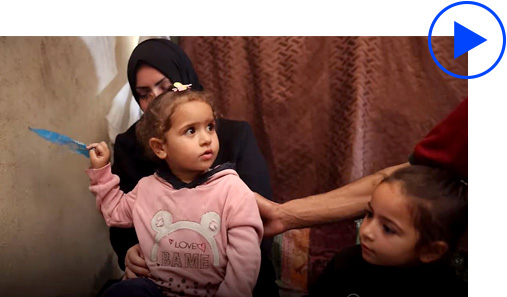
In the West Bank, the EU and several Member States are working with humanitarian partners on the ground to protect communities at risk of forced displacement and settler violence.

Humanitarian aid
When natural disasters occur or conflicts break out, millions find themselves in peril. Humanitarian aid then becomes a lifeline, providing food, shelter and medical care to those most vulnerable.
The EU is at the forefront of these relief efforts and is one of the world’s leading donors of humanitarian aid. It provides needs-based aid to people affected by human-made crises and natural disasters around the world. In 2024, the EU allocated €2.49 billion to help more than 300 million people in need.
The Commission is launching a new Humanitarian Air Bridge operation for those most in need in Syria, to deliver emergency healthcare and other essential supplies, and is increasing its humanitarian funding.
EU humanitarian aid around the world in 2024

The €2.5 billion global humanitarian aid budget includes €956 million for sub-Saharan Africa, €665 million for the Middle East and North Africa, €447 million for Asia, Latin America, the Pacific and the Caribbean, €214 million for Ukraine, the Western Balkans and the Caucasus, and €205 million for non-geographical allocations.
In the Sahel region, ravaged by conflict, climate crises and epidemics, the EU provided vital aid in the areas of malnutrition, displacement, health and education.
The EU supported people affected by protracted conflict and extreme weather events in eastern and southern Africa.
In Afghanistan, where more than half of the population is in need of humanitarian assistance due to conflict, poverty and climate change, the EU provided critical aid both within the country and in neighbouring countries, focusing on food security, healthcare and protection.
In the midst of the escalating conflict in Myanmar/Burma, the EU helped meet the increasing needs of the local population and support Rohingya refugees in Bangladesh.
Victims of conflicts and disasters across Asia also received support. In the Americas, the EU helped address the humanitarian crisis in Venezuela, supported victims of conflict in Colombia, assisted people affected by violence and crime in Central America and elsewhere, helped displaced people across the region and helped organise the first-ever Humanitarian Air Bridge to Haiti in 2024 in response to rising gang violence.
The European Humanitarian Response Capacity in 2024
- 16 crises addressed in 17 countries (Afghanistan, Burkina Faso, Chad, Cuba, Democratic Republic of the Congo, Haiti, Laos, Lebanon, Mali, Niger, Palestine, Rwanda, Saint Vincent and the Grenadines, Somalia, Sudan, Syria and Yemen).
- The European Humanitarian Response Capacity supported Team Europe initiatives in 5 crises, cooperating with 8 Member States for joint operations.
- 93 chartered flights.
- 5 402 metric tonnes of aid transported (by air, sea and land).
- 16 683 passengers transported via EU Humanitarian Aid Flights.
- 3 warehouses opened.
- 817 tonnes of stock mobilised.
- 13 experts deployed.
Throughout 2024, the EU also organised various high-level events to maximise humanitarian impact. In March, the third European Humanitarian Forum - open a new tab. was held in Brussels, Belgium, where the EU announced that it would allocate over €7.7 billion to global crises in 2024.
The following month, the EU, Germany and France co-organised an international conference on Sudan - open a new tab.. In April 2023, civil war had broken out in the country, leading to large-scale displacement and a severe humanitarian crisis. In response to the UN appeal in February 2024, international donors pledged more than €2 billion at the conference. This included almost €900 million from the EU and its Member States to support the civilian population in Sudan and refugees in neighbouring countries.
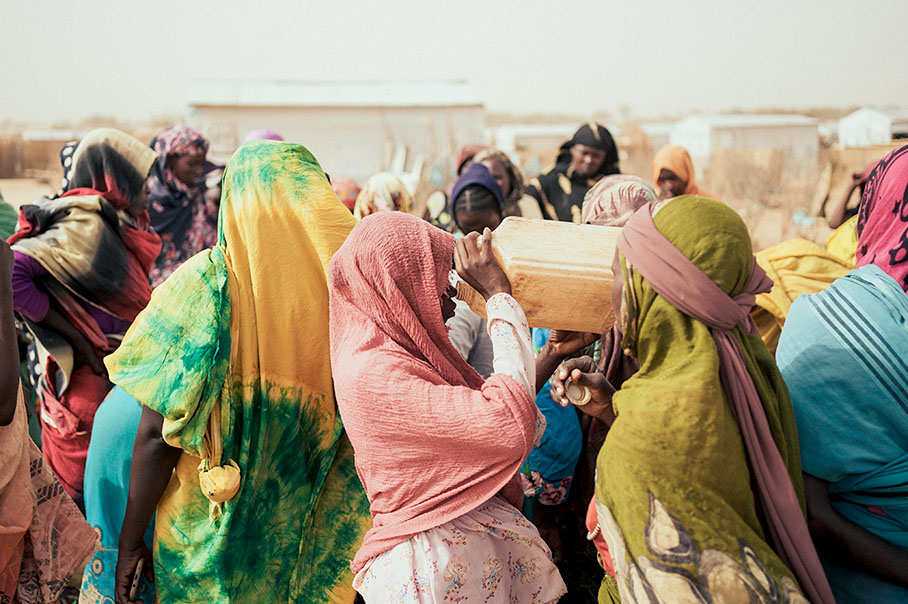
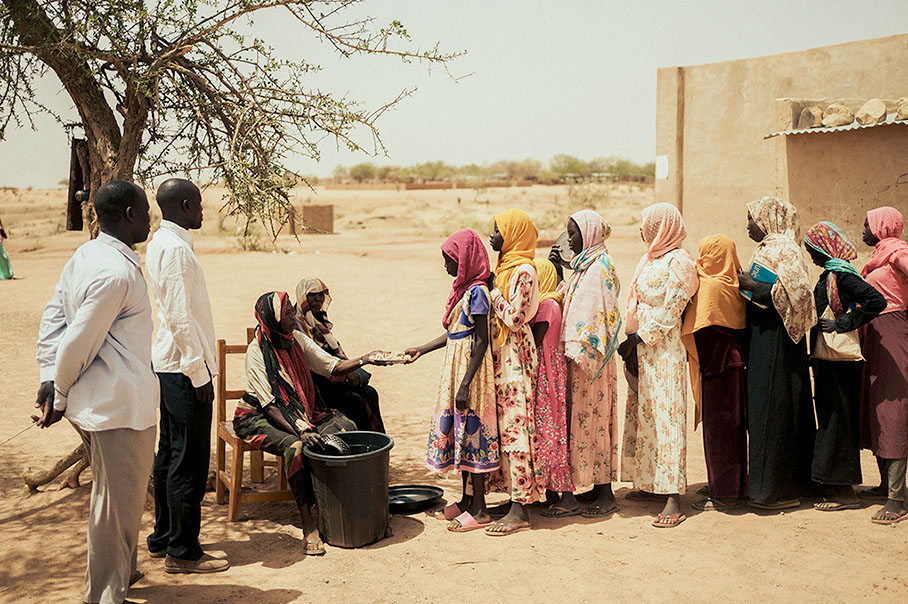
Farchana in Chad is facing a humanitarian crisis caused by the influx of Sudanese war refugees and the effects of recurring natural disasters. More than 800 000 people now face acute food insecurity and are in urgent need of humanitarian aid. 28 and 29 April 2024.
Continuing its commitment to tackling global humanitarian challenges, the EU chaired the high-level ministerial segment of the eighth Brussels Conference on supporting the future of Syria and the region - open a new tab. in May. Participants emphasised the need for a peaceful political solution to the Syrian conflict and for continued financial support for those affected. The EU and its Member States pledged €3.8 billion in grants and remain the largest donor of aid to Syria. These funds are earmarked for the urgent needs of Syrians in Syria, refugees in neighbouring countries and their host communities.
Syria is now in its 13th year of crisis and faces humanitarian needs on an unprecedented scale. Approximately 7.2 million Syrians remain internally displaced, and the need for humanitarian assistance is at an all-time high. Women and children, who make up more than two thirds of the displaced population, are largely cut off from formal education due to the ongoing conflict.
© GOAL
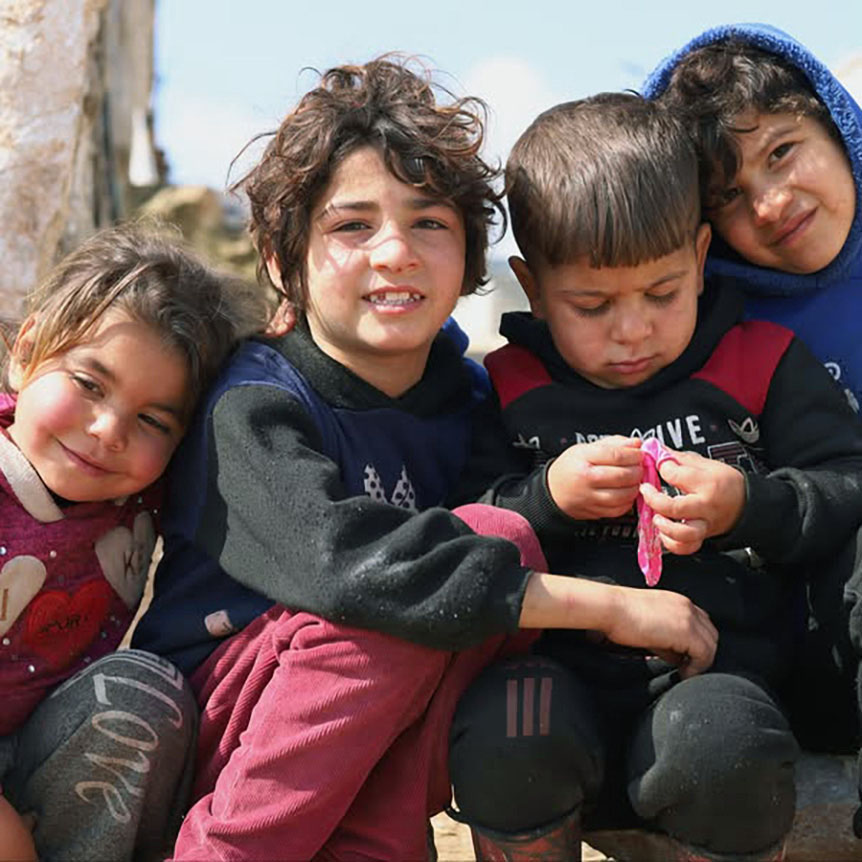
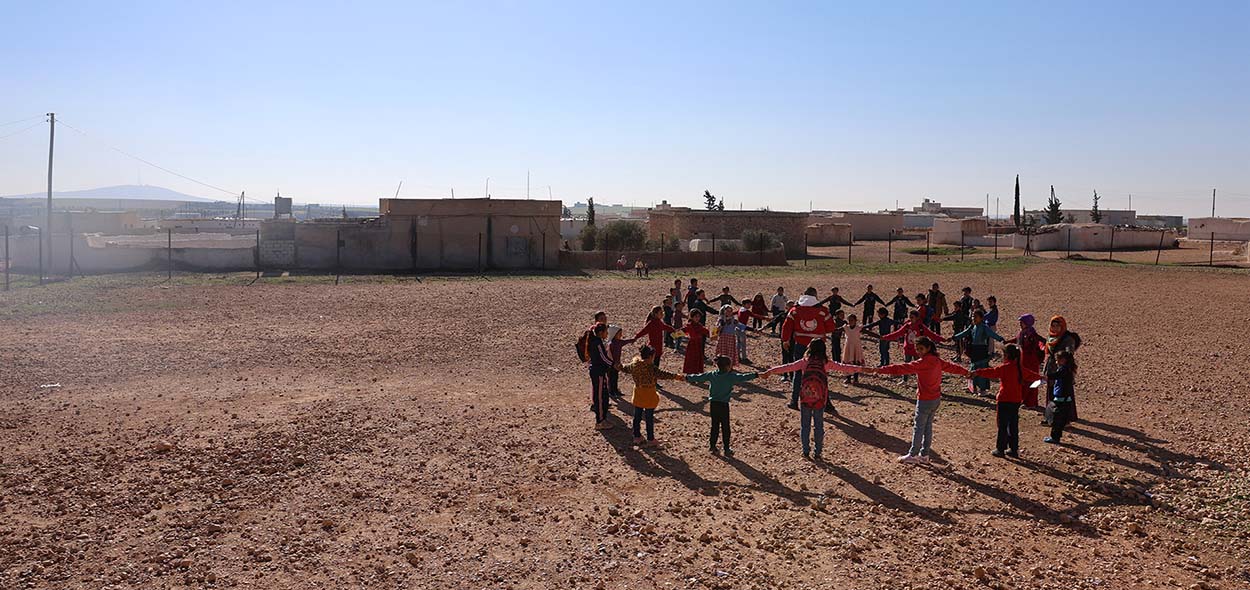
Helping others with disaster prevention, preparedness and response
The EU’s commitment to shaping the future of global crisis management was made clear in June at the Civil Protection Forum - open a new tab. and the Crisis Management Conference - open a new tab.. This commitment resonates strongly with public opinion, which supports a unified disaster response.
In 2024, the EU took further steps to strengthen its Civil Protection Mechanism to better prepare for, prevent and respond to disasters across the EU and beyond (see Chapters 4 and 7).
94 % of people in the EU think that Member States should provide help to other Member States hit by disaster.
91 % think that Member States should provide help to non-EU countries hit by disaster.
90 % think it is important that the EU help coordinate the response to disasters anywhere in the world.
90 % agree that coordinated EU action in this area should be increased in the future.
Source: European Commission, Special Eurobarometer 541 - open a new tab., February 2024.
